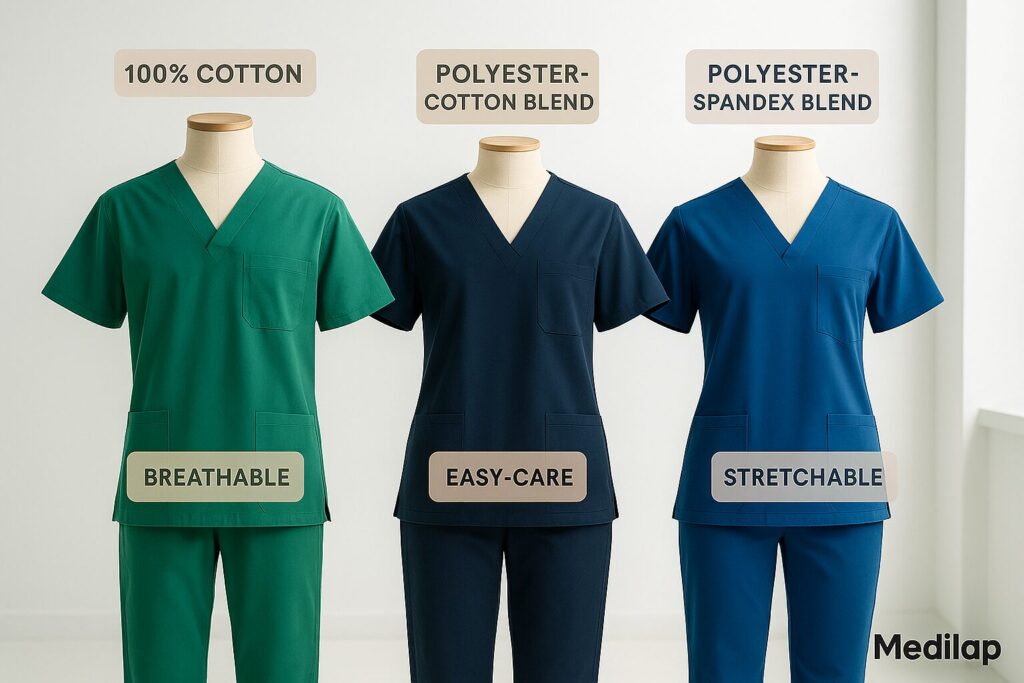Checklist for Buying Medical Scrubs in Pakistan
Medical scrubs are essential uniforms for healthcare professionals in Pakistan. From government hospitals in Lahore to private clinics in Karachi, the right scrubs improve hygiene, comfort, and professional presentation. This guide provides complete medical scrubs buying checklist in Pakistan.
Why Should Pakistani Healthcare Workers Choose the Right Scrubs?
Comfort and cleanliness directly affect patient care and professional performance. In Pakistan’s hot and humid regions, breathable and sweat-wicking fabric becomes essential.
Key reasons to choose well-fitting scrubs:
- Improve focus during long shifts (often 12+ hours)
- Prevent overheating in non-air-conditioned wards
- Ensure mobility in busy environments like ERs and OPDs
- Meet hospital uniform requirements (especially in large cities)
In areas with limited laundry access, quick-drying scrubs also offer practical value.
What Fabric Types Are Best for Pakistan’s Climate?
Pakistani weather demands lightweight, breathable, and sweat-resistant scrubs. Most scrub fabrics in the local market are cotton-rich or poly-cotton blends.
| Fabric Type | Key Benefits | Suitable Regions |
|---|---|---|
| Cotton (100%) | Breathable, soft | Lahore, Multan, Karachi |
| Poly-cotton (65/35) | Durable, cost-effective | Nationwide use |
| Polyester with Spandex | Stretchable, wrinkle-free | Private clinics and labs |
GSM range: 140–160 GSM is ideal for summer wear; 180+ GSM suits cooler cities like Islamabad and Abbottabad.

What Fit Options Are Available in Pakistan?
Scrubs must fit well to ensure professionalism and freedom of movement.
Standard fit styles sold locally:
- Regular fit: most common in hospital supply stores
- Tailored fit: often used in private clinics or dental setups
- Unisex vs gender-specific cuts: Unisex is cheaper; gender-specific is more comfortable
What Features Should You Look For in Scrubs?
Most Pakistani healthcare workers prefer functional designs due to fast-paced work environments.
Recommended features:
- Multiple pockets (especially chest and lower pockets)
- Drawstring or elastic waist for flexible sizing
- Side vents or slits for air circulation
- Moisture-wicking or antimicrobial fabric for infection control
- Reinforced stitching to extend product life
Optional: badge loops and pen holders for hospital rounds or teaching roles.
Are Color Codes or Dress Codes Common in Pakistan?
Yes. Major hospitals and institutions follow medical scrubs color codes for departments and roles.
Examples from local hospital dress codes:
- Blue or green: Surgical teams
- White coats over scrubs: House officers and medical students
- Navy or grey: Paramedics and lab staff
- Pink or purple: Nursing or gynecology departments
Some hospitals provide scrubs, while others require staff to buy their own in the approved colors.
Are There Any Standards or Certifications in Pakistan?
While global certifications like OEKO-TEX or AAMI are not mandatory, quality-conscious buyers still prefer certified fabrics.
In local and imported scrubs, look for:
- Antimicrobial fabric treatments
- Colorfastness and shrink resistance
- Breathability and sweat-wicking ratings
- Flame resistance for emergency departments (optional)
How Many Scrub Sets Should You Own in Pakistan?
Laundry access may vary, so the number of sets depends on your duty schedule.
Recommended number:
- 5–6 sets for full-time doctors and nurses (duty 5–6 days/week)
- 3–4 sets for part-time or rotation duties
- 1–2 extra sets for emergencies or night calls
Quick-dry fabrics are ideal where laundry access is limited.
How to Wash and Maintain Scrubs in Pakistan?
Proper care ensures longevity and maintains hygiene in high-exposure areas like ICUs or wards.
Washing tips:
- Wash scrubs separately in cold or lukewarm water
- Use antibacterial detergent
- Air-dry in sunlight to kill residual bacteria
- Avoid using bleach unless fabric allows
Stain removal:
- Blood: Soak in cold water and salt, then wash
- Ink: Use nail polish remover (acetone) or spirit
- Disinfectant stains: Try lemon juice or white vinegar
